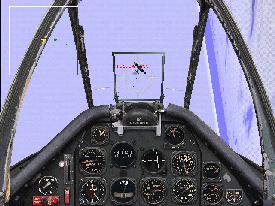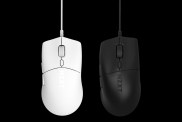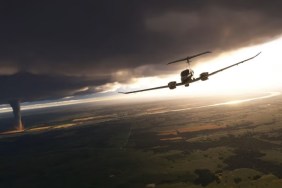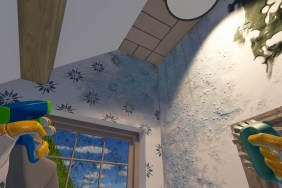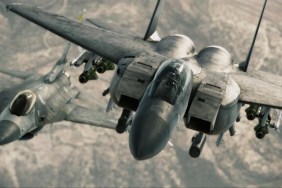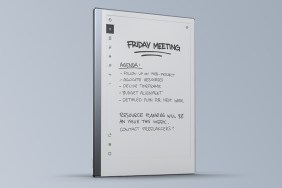“Microsoft’s Return Of The Violent Flight Sim!”
Any of you remember the original Flight Simulator from back in the early eighties?
Are you with me? It had a little WW2 flight game built in. Using FS 1’s rudimentary
graphics you could fly around a little area, supposedly a WW2 battleground,
and shoot a few other planes or bomb your enemy’s hangars and bunkers. It was
very, very basic. In fact, the only thing that separated the two sides was a
little line, symbolizing a river, drawn right down the middle.
Well,
now we have the sequel to that component of Flight Sim 1.0, and predictably
it’s called Microsoft Combat Flight Simulator. Flight Simulator has always
enjoyed an odd popularity. For some reason, its bad graphics and lack of any
real focus or plot never detracted heavily from its sales numbers. Probably,
it was one of those games that was just far enough from being a “real game”
(READ: Violent, Needlessly Violent, Unrealistic, Juvenile, and More Fun Than
Sex) so that middle aged yuppies could play it without thinking they were wasting
their time with less than intellectual pursuits.
It’s similar to the difference between those who fly planes in their spare
time and those who jump out of planes in their spare time. So here we have a
WW2 Flight sim designed mainly for the same crowd. Before the combat aspects
of this game are even taken into consideration, most Microsoft Flight Simulator
fans are going to like this one simply because it’s basically a graphical update
and a new scenery pack for Flight Simulator 98.
In the game you are presented with four ways to fly, Free Flight, Instant
Combat, Single Mission, and Campaign. Free Flight is the mode that most MSFS
fans will be familiar with: pick any plane, any place, and aimlessly fly around.
Instant Combat is similar, except that you fly against enemy planes that come
at you in arcade like waves (major loss of realism). Single Mission is where
you fly any one mission from any of the campaigns in any of the planes (including
a few from WW1, why?). Finally Campaign is just your regular pre-scripted campaign
where you may fly for either the USAF (Which actually didn’t exist at the time,
back in WW2 it was called the US Army Air Corps, USAAC), the British Royal Air
Force (RAF), or the German Luftwaffe.
One of the game’s major flaws is that the campaign mode is about as stale and
non-immersive as you can get. Basically all you have is a bunch of strung together
missions with minimal continuity and only text briefings to flesh things out.
This does next to nothing to draw the player into the game. Considering the
immense narrative depth that any decent writer can achieve using the dramatic
backdrop of WW2, this sort of stale experience is a puzzling letdown.
Now, the graphics are very nice. MSCFS leaps ahead of Flight
Simulator 98 like an Olympic long jumper on steroids. The textures on the
ground are near photorealistic, even though they are tile based, almost looking
as good as those found in Flight Unlimited 2. Furthermore
they look decent at anywhere from 500 feet up which is fairly impressive. The
terrain is simply much better than previous Flight Simulator titles.
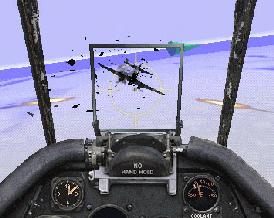 The
The
buildings in the cities are nicely done, those that are tall enough to be modeled
that is. The planes are very sharp and detailed, they even lose shrapnel when
you shoot ’em. One complaint I do have is that in the cities only the tallest
buildings and monuments are modeled in 3D. I don’t know about all of you, but
to me, flying over a flat texture with only the Le Tour Eiffel and L’Arc de
Triumph popping up is not a convincing simulation of flying over Paris.
On the other hand, one nice thing about all of this is that MSCFS will
run well on any decently equipped PC and supports almost all D3D compatible
accelerator cards.
As far as the actual gameplay goes, MSCFS is fairly bland and uninspiring.
The first time I hopped into a North American P51-D and took to the skies in
‘Instant Combat’ I must have downed at least 25 Messerchmitts, which is far
to easy and non-dramatic. The main problem is with the enemy AI, as soon as
you get on their tails they basically fly in a straight line until you pump
their asses full of hot lead.
The flight modeling is also not as realistic as Flight Simulator patrons have
come to expect from their beloved series. Roll rate and Pitch rate are fairly
lax and the defining elements of any simulation, like say… landings, are a tad
bit too easy.
Now, since this is a Flight Simulator game, Microsoft has left the plug in
architecture found in their previous efforts. In fact, you can take any plane
from MSFS 98 or any add on, and pop ’em in the game. MSCFS automatically
straps a pair of machine guns to ’em and lets you go off and kill in a Cessna
172 or an Extra ES 300, for instance. While occasionally fun, this shreds the
last feeling of historical accuracy the game has.
Multiplayer is decent, basically it’s the same combat, just with opponents
who don’t seem to be so eager for rear entry. Multiplayer is supported over
the modem to modem, serial cable, modem to modem, IPX, TCP/IP, and over Microsoft’s
The Zone internet gaming service.
To lay it down straight, if you really, really like the Flight Simulator series
then you’ll probably want to run out to the store like a lemming and drop $50
on it. However, with the impending releases of such innovative titles as Jane’s
WW2 and PARSOFT’s Fight Squadron: Screaming Demons Over Europe, you’ll
probably do better to hold off on this one and wait for the big boys to land.
-
Sweet Graphics
-
Flight Sim Fans Will Like It
-
Reasonably FUN
-
Lax Flight Model/Bad A.I.
-
Unconvincing Cities
